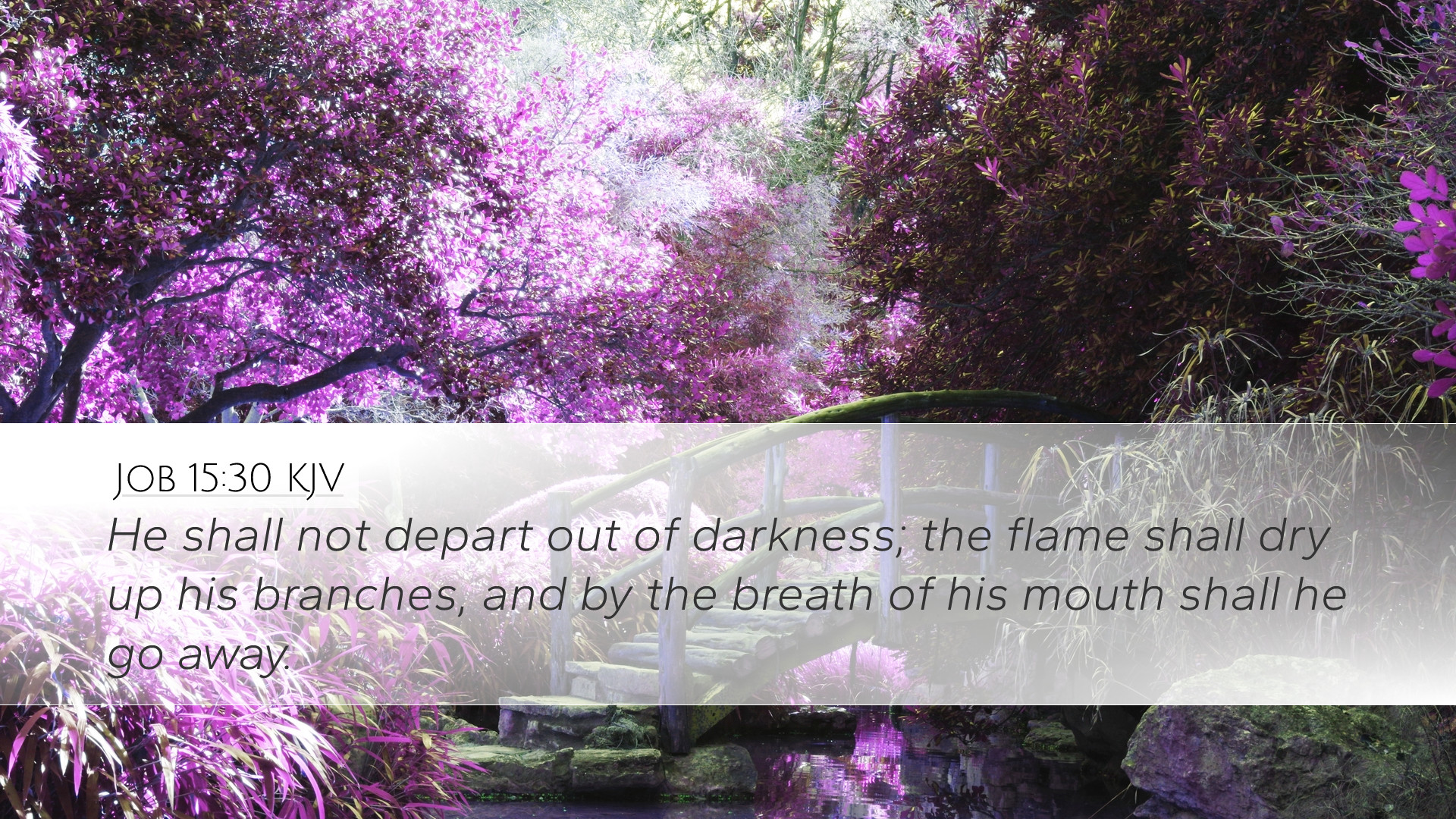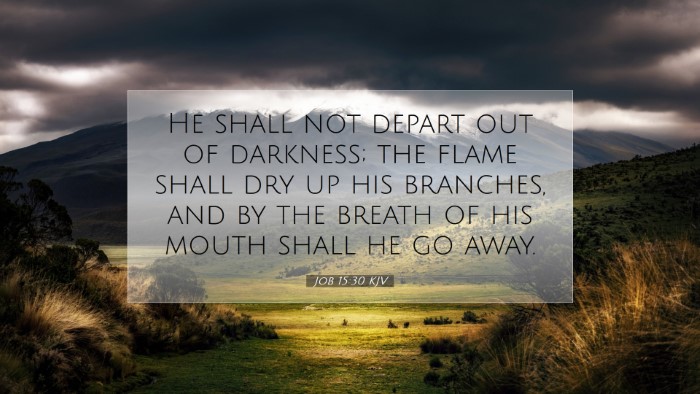Commentary on Job 15:30
Verse Reference: Job 15:30
Verse (KJV): "He shall not depart out of darkness; the flame shall dry up his branches, and by the breath of his mouth shall he go away."
Overview
The biblical book of Job delves deep into the themes of suffering, divine justice, and human folly. In this verse, Job's friend Eliphaz is speaking, articulating the conventional wisdom of the time regarding the fate of the wicked. This passage encapsulates significant theological insights and moral reflections that are pertinent to discussions of divine retribution and human righteousness.
Commentary Insights
Understanding Eliphaz's Argument
Matthew Henry identifies Eliphaz as a representative voice of traditional wisdom, asserting that wickedness leads inevitably to destruction. His proclamation serves as an admonition to Job, who has been portrayed as upright and yet suffers profoundly. Eliphaz claims that those who are unrighteous will find no solace, as darkness envelops them. This darkness is not merely physical but signifies a profound spiritual desolation.
Symbolism of Darkness
Darkness symbolizes ignorance, sin, and divine judgment. Albert Barnes elaborates that in the biblical context, darkness often represents the absence of God’s favor or presence. The imagery of being trapped in darkness denotes separation from God, aligning with the overarching theme of sin leading to spiritual death.
The Flame and Its Consequences
The reference to the flame drying up branches speaks to the destructive consequences of sin. Adam Clarke remarks that this imagery reflects the ultimate demise of those who pursue wickedness. Just as a tree deprived of water wilts, so too will a wicked soul perish under the judgment of God. The flame symbolizes purification, yet in this case, it is a harbinger of judgment leading to complete annihilation.
Breath of His Mouth
Moreover, Clarke points out that the phrase "by the breath of his mouth shall he go away" suggests the profound efficacy of divine pronouncements. The breath of God holds the power to create and to destroy, to bring life and to summon death. This emphasizes God’s sovereignty and the ultimate authority of His judgment. It implies that God’s word is decisive in the fate of the wicked.
Theological Implications
Righteousness vs. Wickedness
This passage prompts serious reflection for believers regarding the nature of righteousness and the grave consequences of sin. Matthew Henry asserts that Job’s suffering, while seemingly motiveless, calls into question the simplistic dichotomy of good and evil leading to proportional rewards and punishments. Eliphaz’s argument, while rooted in truth, lacks the depth of understanding that Job’s experience brings forth — namely, that suffering may also be part of God’s sovereign plan that is beyond human comprehension.
Cultural Context of Retribution Theology
Albert Barnes notes that retribution theology was a dominant paradigm among ancient Israelite thinkers. Eliphaz reflects this normative belief that prosperity is the reward for righteousness while suffering is the consequence of wickedness. However, clergy and scholars today should scrutinize such assumptions, especially in light of the Book of Job as a counter-narrative that explores the complexity of God’s justice.
The Role of Suffering
Suffering in the life of a believer is a nuanced topic. Where Eliphaz sees Job's affliction as punishment for unseen wickedness, many theologians today recognize suffering as a means of growth, testing, and refinement. Matthew Henry states, “God often sends his saints into the furnace to purify them, not to consume them;” thus, the experience of darkness can also serve as a crucible for strengthening faith.
Conclusion
In summary, Job 15:30 serves as a poignant reminder of the tension between righteousness and the journey of suffering. While Eliphaz articulates a truth — that the wicked face divine judgment — the complexity of Job’s situation invites a deeper theological reflection on the nature of suffering and God’s justice. The insights drawn from prominent commentators illustrate that in every era, the faithful are called to wrestle with these concepts, affirming God’s sovereignty and the ultimate victory of righteousness over sin.
Reflection Questions for Study
- How do we reconcile the presence of suffering in the life of the righteous with the belief in a just God?
- In what ways can this passage inform our understanding of judgment and mercy?
- What practical applications can we derive from the imagery of darkness and flames in our spiritual lives?


